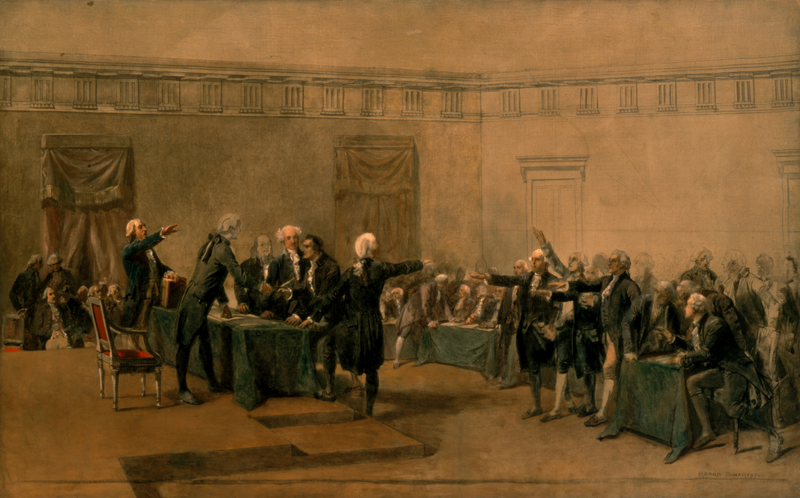Democracy and despotism in a digital age.
Conservative Rationalism Has Failed

Part I: Unfettered reason cannot conserve anything.
In his writings and National Conservatism conference, Yoram Hazony is playing a significant role in reviving the notion of nationalism in America. The following essay, based on the Herbert W. Vaughan Lecture he delivered at Harvard Law School on April 2, 2019, is followed by Part II: Honor and self-constraint can stave off tyranny.
To ensure you don’t miss critique and discussion of this essay being published in our ongoing feature, “Has Conservative Rationalism Failed?“, subscribe to The American Mind newsletter now!
In recent decades, American and European elites have devoted themselves to the project of rethinking society from scratch.
What were once linchpin concepts such as family and nation, man and woman, God and Scripture, the honorable and the sacred, have been found wanting and severely damaged, if not overthrown. The resulting void has been filled by new doctrines, until now mostly neo-Marxist or libertarian in character. But a racialist “white identity” politics in a Darwinian key is gathering momentum as well.
All three of these approaches to political and moral questions are, in a sense, creatures of the Enlightenment, claiming to be founded on a universally accessible reason and to play by its rules. This is another way of saying that none of them have much regard for inherited tradition, seeing it as contributing little to our understanding of politics and morals.
Because contemporary political doctrines claim to play by Enlightenment rules, conservatives seeking to stem the tide of the revolution have often felt that they would be on the strongest possible ground if they appealed to universal reason themselves: Catholic scholars, for example, have led the effort to develop an updated political theory based on natural law. Whereas Straussians, to cite another prominent school, have sought to elaborate the theory of Lockean natural right, fortifying it with the assertion that the American Declaration of Independence commits the United States to such a view as a kind of official ideology of the state.
These efforts have generally been conducted by individuals who are personally sympathetic to political conservatism—that is, to the preservation of the inherited political and moral traditions of Western nations. And yet it is striking that these attempts to revive natural law and natural right defend a conservative political understanding that is itself created in the image of their opponents: The rationalist school of Enlightenment political theory—Hobbes’ Leviathan, Locke’s Second Treatise, Rousseau’s Social Contract, Spinoza, Kant—insisted that it was speaking in the name of a universal reason that is supposed to be accessible to everyone, in all times and places, and to provide the one correct answer to all foundational political questions. In just the same way, present-day “conservative rationalists” insist that their own political thinking is the product of universal reason, accessible to all, and leading to the one true answer on political things. Missing from such conservative rationalism is any significant place for tradition—any reason to prefer political and moral concepts that have held good and done good for our ancestors and for us over centuries, if not thousands of years.
Although conservative rationalism can boast of certain impressive achievements, as a general matter it is fair to say that conservative rationalism has failed: It has not visibly retarded the progress of the revolution that has so damaged the most basic of inherited Jewish and Christian concepts. But beyond this, by endorsing the methods and assumptions of Enlightenment rationalism, conservative rationalism has contributed something to the calamity, leaving the traditions that once upheld the political order in America and other Western countries—understood as the inherited customs of particular nations—largely without defenders.
This is a decisive point, because traditions of ideas, regardless of their content, are never disembodied things that float free of the families, tribes and nations into which real human beings are born and in which they are educated. Our ideas, no matter how much we may develop and revise them or rebel against them in part, are still the product of the traditions we inherit (or adopt later in life). Because conservative rationalists mistake their ideas for universal thoughts that can be accessed universally, they pay little attention to way in which the traditions of nations are formed and what it takes to strengthen them or even to maintain them. Their students are therefore largely unaware, for example, that it is not freedom, but honor and self-restraint that are primarily responsible for the solidity of national traditions. Without understanding and practice in these things, “conservative rationalists” cannot in fact conserve much of anything, and often end up taking part, on a daily basis, in the general undermining of the very things that they say they wish to conserve.
Conservative rationalism has led not to a flourishing of the conservative impulse in America, the UK, and other nations, but rather to its extinction. If there is any hope of a conservative rebirth, it must be in the direction of a more “conservative conservatism”—one that is based on the particular biblical and common law traditions of these nations, and on the thought of individuals such as John Selden and Edmund Burke who spoke with force about the outcome if political philosophy were to set its hopes on the accessibility of universal reason. If we wish for anything at all to be conserved out of the current conflagration, it will have to be through the recovery and inculcation of the particular Anglo-American political and religious traditions that were the original source of the English-speaking nations’ cohesion and strength.
World War II and the Displacement of Christian Tradition by Liberalism
On January 4, 1939, Franklin Roosevelt gave the State of the Union address to an American nation he believed would soon be at war. Roosevelt knew that America, Britain, and their allies would have to fight not only Nazism and its imitators, but possibly Soviet Communism as well. What would the Western allies be fighting for in the coming struggle? In Roosevelt’s eyes, the war would be fought for three things. As he put it:
[Events] abroad directly challenge three institutions indispensable to Americans, now as always. The first is religion. It is the source of the other two—democracy and international good faith.
According to this view, both the freedoms that are the inheritance of Americans as individuals, and the freedom of Americans as an independent nation among others, have their source in one place—which is the Christian inheritance (or, if you like, the Jewish and Christian inheritance) of this nation and of the West. FDR supposed that the Nazis and the Marxists knew this as well as he did and were seeking to overthrow not only democracy but its Christian source too. Their aim, he said, was to achieve
[a]n ordering of society which relegates religion, democracy, and good faith among nations to the background… [but] the United States rejects such an ordering and retains its ancient faith.
FDR’s framing of what was at stake made the impending conflict not only a war about freedom, although it was surely that. It was also a war about religion. In fact, in the same address, Roosevelt described the conflict as one between the “God-fearing democracies” and their enemies—those nations that did not fear God, the biblical Amalek.
It is striking how far this framing of the war differs from what is taught in most schools and universities today. It is a rare instructor in history or politics who describes the struggle against Nazism and Marxism as one fought between “God-fearing democracy” and its enemies. It is usually said that the war was fought between “liberal democracy” and its enemies. But Roosevelt seems not to have been aware that liberalism was the cause in whose name hundreds of thousands of Americans were about to give their lives. In fact, the words “liberal” and “liberalism” appear nowhere in the eight pages of his address.
This shift isn’t just about word-choice. The fact is that America, Britain, and other Western countries have undergone a dramatic change in self-understanding in the wake of the trauma of the Second World War. Somehow, a war fought to defend God-fearing democracy inadvertently ended up destroying the religious foundations of the victorious Western nations. Over the course of a few generations, the God-fearing democracies came to see themselves as liberal democracies, and liberalism replaced Christianity as the fundamental framework within which these nations lived and conducted their affairs.
We can see the beginning of this change immediately after the Second World War in the U.S. Supreme Court’s determination in 1947 that state governments may no longer support and encourage a particular religion or any religion. Technically, this decision is deduced from the First Amendment of the Constitution as applied through the Fourteenth. But of course, the Fourteenth amendment (1868) had already been on the books for 79 years without anyone recognizing that support and encouragement for religion by the states was a violation of individual’s right to due process.
What had changed in the interim was not the letter of the law, but the narrative framework through which the Justices of the Supreme Court, as representatives of elite opinion, understood the relationship between Christian tradition and the American nation. That there has been such a change is obvious from the fact that by the time one reaches Everson v Board of Education (1947), Justice Hugo Black feels constrained to provide a new story of the American founding broadly hostile to government encouragement of religion. Among other things he writes:
“[I]t is not inappropriate briefly to review the background and environment of the period in which that constitutional language was fashioned and adopted. A large proportion of the early settlers of this country came here from Europe to escape the bondage of laws which compelled them to support and attend government favored churches. The centuries immediately before and contemporaneous with the colonization of America had been filled with turmoil, civil strife, and persecutions, generated in large part by established sects determined to maintain their absolute political and religious supremacy. With the power of government supporting them, at various times and places, Catholics had persecuted Protestants, Protestants had persecuted Catholics, Protestant sects had persecuted other Protestant sects, Catholics of one shade of belief had persecuted Catholics of another shade of belief, and all of these had from time to time persecuted Jews. In efforts to force loyalty to whatever religious group happened to be on top and in league with the government of a particular time and place, men and women had been fined, cast in jail, cruelly tortured, and killed.”
In Black’s retelling, religion is no longer the source of American democracy and independence, as it had been in FDR’s State of the Union address eight years earlier. Religion is now portrayed as a danger and a threat to democratic freedoms, the very form of the American Constitution having been the result of the excesses of religion that drove the first Europeans to settle in America.
It is here that we find the transition from a God-fearing democracy to a liberal democracy: One in which religion is perceived as being so great a threat that the federal government must act to ensure that no child in the country is taught religion in any publicly supported school. Within less than two decades, the Supreme Court had banned not only religious instruction but prayer and devotional reading from the Bible in schools, placing the great majority of the nation’s children in the care of a safe space scrubbed clean of any reference to the place of Christianity and Judaism in laying the foundations of the American republic. Instead of arising out of longstanding Christian tradition, America was reimagined as a product of Enlightenment rationalism: In the high school I attended in New Jersey, we heard not a word about the Bible or the common law, but we were taught about Hobbes, Locke, and Rousseau.
The public schools and the elite universities provide the public space in which the American mind is shaped. What is legitimate in these institutions is what ends up being legitimate in the public life of the country a generation later. A nation that honors its religious traditions in the schools will end up honoring traditions in the broader public sphere. A nation that heaps dishonor on its religious traditions by banning them from the schools will end up dishonoring its traditions in the broader public sphere as America consistently does today.
Why Rationalism Does Not, Cannot, and Will Not Work
It is a commonplace among conservative commentators that the demolition of traditional concepts and norms is being driven by Marxists (also called “neo-Marxists,” “cultural Marxists,” or just “the Left”), especially in the universities. Marxists are an easy target for criticism because they say explicitly that their aim is to critique the concepts employed by existing power structures with the aim of undermining them.
But the neo-Marxists are not sufficient as an explanation of what we’re seeing. Even in the universities, where the Marxists are strongest, they remain a minority. In government and among the public, they have not, until very recently, been more than a curiosity, and could not by themselves have affected the sweeping civilizational changes that have been under way for decades. Think, for instance, of the elimination of references to God, the Bible and prayer from the schools; the public embrace of new sexual norms, easy divorce and abortion; or the collapse of Western nations’ will to pay back their debts or regulate immigration. In these cases, as in many others, it wasn’t the Marxist minority that determined the course of events. These things happened because they were supported by a broad liberal public, and were promoted by its elected representatives in both the Democratic and Republican parties in America, and on both the center-left and center-right in Europe.
The key to understanding our present condition, then, is this:
If liberals had been willing and able to mount a vigorous defense of inherited political and moral norms against the conceptual revolutions proposed by the neo-Marxist left, these challenges would have been defeated easily. But liberalism has proved itself either unwilling or unable to successfully defend almost any inherited political ideals or norms once a focused attack on them has been under way for twenty or thirty years.
Why is liberal political thought systematically incapable of defending inherited traditions? Virtually all of liberal thought today— including that of “social liberals” such as John Rawls; and that of “classical liberals” or “libertarians” such as Robert Nozick—is based on Enlightenment rationalist political theories that were purposely designed to be independent of all inherited political traditions. In fact, the central claim of Enlightenment political theories was that they were based on “reason alone,” which meant that they could, in principle, be understood and agreed upon by anyone, regardless of the particular religious or national traditions in which they were raised. Reason alone was said to be all you needed to derive and wield ideas like individual freedom, equality, consent, and universal rights—the central ideas in the toolkit of contemporary liberalism.
The trouble with these Enlightenment rationalist claims is that they aren’t actually true. In fact, individuals exercising “reason alone” do not come to any kind of stable consensus about anything. As the great English political theorist John Selden wrote already in the 17th century, reason alone is capable of coming to virtually any conclusion.
This brings us to the uncertainty and inconsistency with which the free and unadorned application of reason has always been burdened…. [N]o one of any education can be unaware that in ancient times even the masters and practitioners of right reason, i.e., the philosophers, took part in endless discussions about good and evil, and the boundaries that separated them, in which they were completely at odds with one another. There was no one to put an end to these disputes. The number of sectarian groups multiplied, and so many new doctrines sprouted up that even though the study of philosophy was based upon the most careful reasoning possible given the intelligence and talents of its practitioners, the number of its schools would easily have reached [the apocryphal figure of] 288 if every difference in doctrine had been formalized. …
Thus people who have set about seeking the universal principles of living well have arrived at very different conclusions, among which everyone considers his own to be the best, and usually either condemns or criticizes everyone else’s. … Hence both Zeno and Chrysippus, as well as the Persian Magi, considered relations with one’s mother and even with one’s daughter to be permitted, just as were relations with other men; and the philosopher Theodorus said the same about theft, sacrilege, and adultery. And yet the jurist Ulpian (who was not even a Christian) and others of the pagans said explicitly that these are crimes against nature; while Theodotus, Diagoras of Melos, and some other well-known writers completely undermined all the fear and respect that rein in humanity by claiming that the gods did not exist. Add to these Plato, the most divinely inspired of all philosophers, who believed that women should be held in common and people should be able to have sex with almost anyone they want; and the others who thought that all possessions should be shared as though the law required it. Then there are the teachings of Archelaus, Aristippus and Carneades, according to which nothing at all that is just depends upon nature; rather, what we call “just” is based in fact on written law, and on the preferences or interests of human beings…. And yet we hear everywhere that law (especially natural law) is right reason; and everyone agrees with this sentiment, even those who disagree fiercely about what “right reason” is. …
We should therefore use with caution, and not be too quick to depend upon, the unfettered and simple application of analytical reason alone, which is often thought to be so unpredictable and unstable that what one person sees (particularly in this kind of investigation) as a very evident principle, or a conclusion which follows from a principle, will often seem to another person of equal intelligence to be obviously false and worthless, or at least inadmissible as truth. This is just what happened all the time among those heroes of the discipline who used free and untrammeled reason to argue about the nature of good and evil, the shameful and the honorable, as everyone knows who is even slightly familiar with their writings. This is why Tertullian says as follows about the philosophy of the gentiles, i.e. about using the kind of reason which they generally called “right:” It reserves nothing for divine authority; it makes its own opinions into laws of nature. Considering the variety of philosophical schools and sects, you are not likely to find anything as unclear and contradictory as these “laws of nature.”
Selden published these words in 1640, but they might as well have been written today. Enlightenment-inspired liberals insist that “reason alone,” exercised through the sole instrument of open debate in the universities and in the public sphere, will lead everyone to their preferred conclusions about politics and morals. The reality, however, is that the exercise of free human reasoning leads to Marxism or to a quasi-Darwinian “white identity politics” just as easily as it leads to social liberalism or libertarianism. And tomorrow, it will lead somewhere else entirely, abandoning the results of today’s reasoning as relics of a bygone and benighted past.
We can now understand the causes of the present trajectory of public life in the Western nations. Until the eve of the Second World War, these were still, in many respects, traditional societies. True, these “God-fearing democracies” respected Enlightenment philosophy and liked the idea of “having to do your own thinking” (as FDR put it). But it was not “doing your own thinking” that had produced the basis for a stable nation. It was Protestant religious and political tradition that determined the fundamentals of the political order. The power of the Enlightenment’s “critique” of all inherited tradition continued to be balanced and contained by the force of Christian tradition. Within two decades of the conclusion of the war, this balancing force had collapsed. In despair over its horrors, Americans and Europeans were now prepared to embrace Enlightenment, and to accept whatever political truths might be dictated by reason alone.
The revolution unleashed in this way did have certain positive consequences. Among these I would count the elimination of state-sanctioned racial segregation in the American South, and other items could certainly be named. But the new era of what Selden called “free and untrammeled reason” as the sole guide for our understanding of what is good and right has thrown us into a perpetual revolution that is devouring all inherited wisdom and common sense. As is now obvious to many, this revolution has no natural stopping point. If its course cannot be deflected, it will end with the destruction of the Western democracies and their replacement by a despotism sufficiently vicious to be able to put a stop to the revolution by force. ![]()
Read Part II of this essay here.
The American Mind presents a range of perspectives. Views are writers’ own and do not necessarily represent those of The Claremont Institute.
The American Mind is a publication of the Claremont Institute, a non-profit 501(c)(3) organization, dedicated to restoring the principles of the American Founding to their rightful, preeminent authority in our national life. Interested in supporting our work? Gifts to the Claremont Institute are tax-deductible.
One dose will erase your whole political mind.
The dissident Right has no idea where it’s going, but it knows it wants to get there fast.






